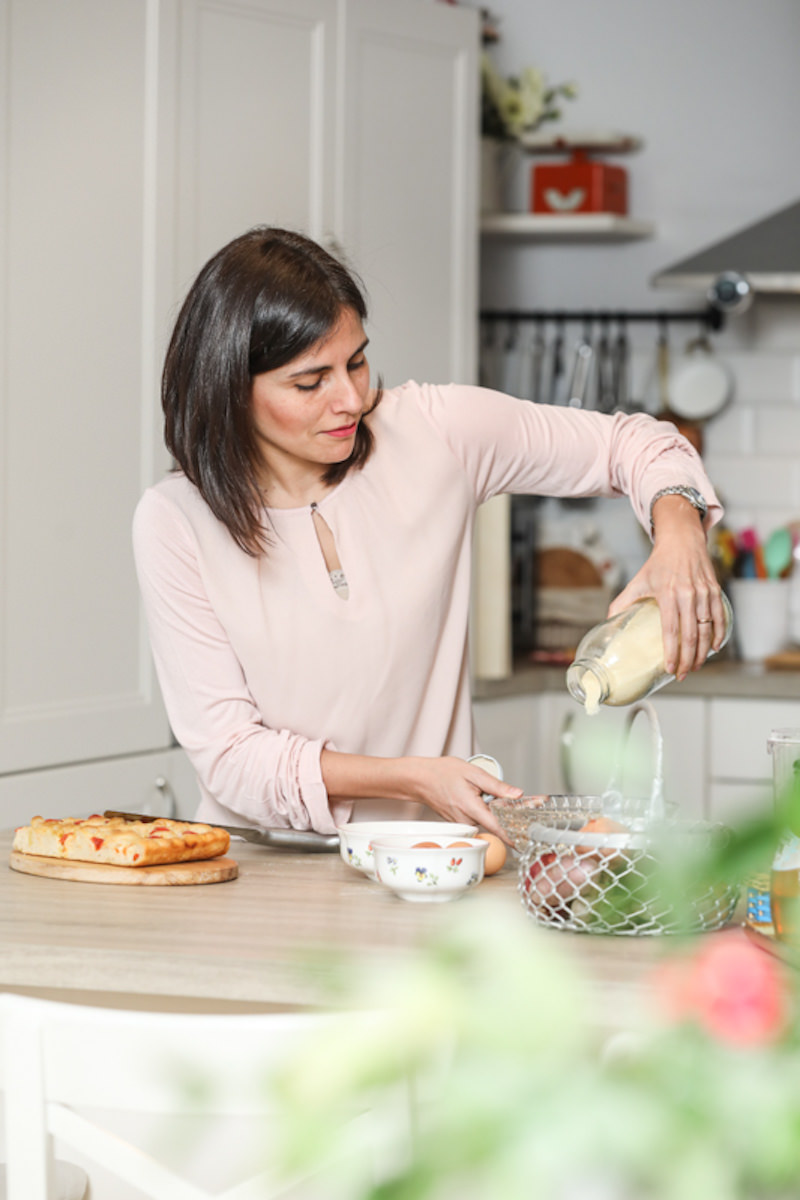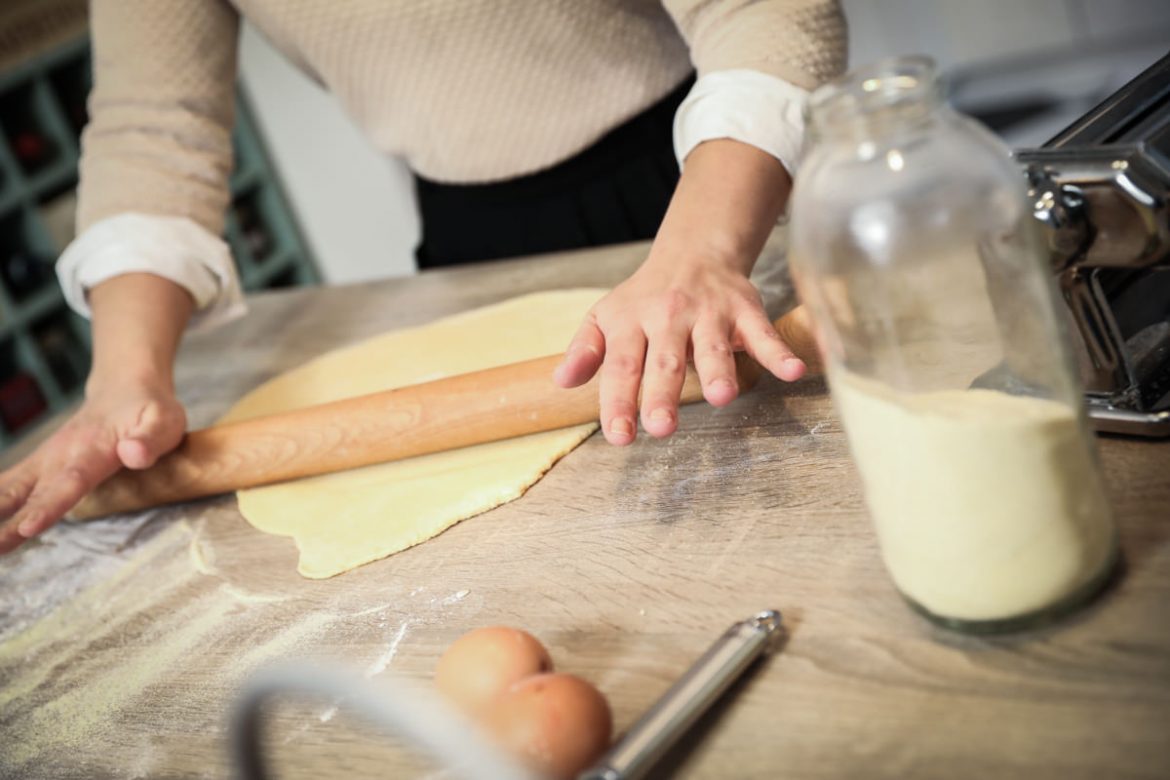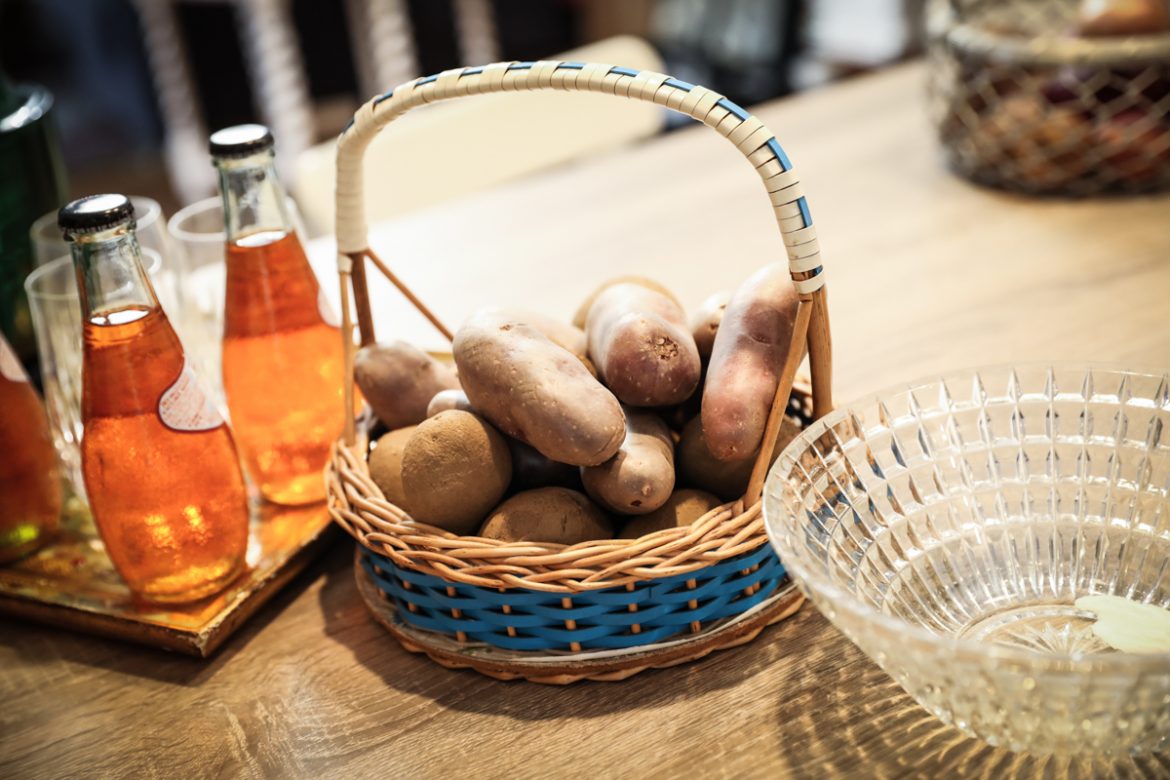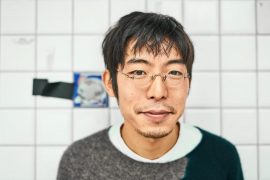We meet Monica Riboni and Valeria D’Amico on a Wednesday morning in Düsseldorf-Düsseltal at Monica’s apartment. The two Italian ladies moved from Milan to Düsseldorf with about 30 other families when their husbands’ company was relocated there. Since last year, the two women teach Italian cooking classes and can be booked as ‘Chef-at-Home’. Together with their guests they then cook Italian specialties ‘A la Nonna’ — grandma style.
The two young mothers attended German classes and speak with a delightful Italian accent while busying themselves in the kitchen and serving coffee in small, wonderfully kitschy cups. Monica’s flat is a haven of gorgeous bric-à-brac — all from flea markets as they both passionately point out.
*** Hier geht es zu deutschen Version des Beitrags / Click here for the German version of the article ***
THE DORF: Where are all the pretty things from? MONICA: All from flea markets! The flea markets in Germany are much better than those in Italy. There are much better bargains. In Italy, there are usually antiques at flea markets and they are priced accordingly. VALERIA We always take our visitors from Italy to the flea market and they love it as much as we do.
TD: Thank you very much for the invitation! What’s for lunch today? M: First there are antipasti. Onions filled with a mixture of bread crumbs, capers, olives, tuna and anchovies. In addition, an octopus salad with fennel which I prepared this morning because octopus takes a lot of time. As a main course we serve pasta, homemade of course, with saffron, leek, potato cream and prawns. The dessert is panna cotta with orange cream, chocolate sauce and caramel crumbles.
TD: Wow. Sorry about the generic question, but: how do you manage to stay thin? V: I eat everything but not too much. M: I love eating and probably will become chubby at some point (laughs).
TD: Could you explain what to expect when I book ‘La Cucina di Casa’? V: That depends on what you book: if we come to somebody’s home as a ‘Chef at- Home’ or ‘Book a Cook’, we cook for the clients in the privacy of their own home. We focus on regional, Italian cuisine and its traditional recipes that we’ve known since our childhood. Our mothers and grandmothers passed those recipes to us as they have been passed down from mother to daughter for generations. First, we put a menu together with the client. After that we deal with everything else; from shopping to cooking, to setting the table and serving. All we need for that is a kitchen. Our clients can relax together with their guests and enjoy. Naturally everybody is welcome in the kitchen and can have a peek in the pots and pans. M: In our cooking classes, we go on a culinary journey together, discovering the small, well-guarded secrets of the regional Italian cuisine. It is a lot of fun to cook together and the effort is rewarded with the delicious results. The cooking classes are suitable for friends, team events or simply for people who enjoy cooking with others. The menu is established beforehand so that there is something for everybody. The motto is: everybody has to join in. We do not want to stand in front of people and talk. Everybody has to take part so they learn something — there is something to do for everybody. But we are not professional chefs. We cook the dishes that we grew up with, nonna’s and mama’s food. And recipes that we find in our cookbooks. But everything is always done with a lot of passion.
TD: What was your favourite recipe of your nonnas? M: My grandma had three recipes she always cooked on a Sunday. Those were: gnocchi, polenta with brasato — brasato is a beef roast — and risotto. Risotto is a classic dish of the region I come from, Lombardy. V: My favourite recipe of my grandma was ravioli with ricotta and spinach, we had that every Sunday. It was also the first recipe I learned from her. I was probably 16 years at the time.
TD: A restaurant where you always wanted to go but haven’t been to yet? Valeria: the sennhütte – we both have been wanting to go there for a while
TD: What is your favourite dish? MONICA: Tagliatelle al ragu.
TD: And your first recipe, Monica? M: My first recipe, I think, was gnocchi. My grandma had 6 grandchildren. She prepared the dough and we always came an hour earlier to roll the gnocchi for the 14 people of our family.
TD: What is the typical cuisine of the region you come from? M: Polenta is a typical dish in Milan, and the Lombardy respectively. This is rarely served in Germany even though it is such an essential Italian recipe. It’s served mainly as a puree with a piece of cheese in the middle. Leftovers are cut and grilled or baked the next day. V: I come from Cagliari, Sardinia. We eat a lot of fish there. We also often make fregola, that is a small pasta almost like couscous, or it’s prepared as a soup with fish. M: Valeria makes amazing gnocchetti Sardi, we cook that often in our classes because it is a lot of work and everybody has something to do then. We prepare it with a salsiccia tomato sauce. Salsiccia is rather difficult to find — but at Andronaco’s in Cologne we can find some. Also at Saitta in Düsseldorf, they have great products — but they are unfortunately quite expensive.
TD: Where else do you buy your ingredients? M: We buy the fish at the Metro. Also at Centro, unfortunately they had to relocate from the Ackerstraße because their contract ran out after 30 years. There is a shop on the Nordstraße and the new one will open on the Königsberger Straße.
TD: What did your mum or nonna make when you were ill? M: Mhhh, let me think … Pastina. That is a soup with very small pasta shapes, stars for example. Homemade broth with this little pastina was cooked for ill children. V: (pureeing something at the stove) My mum made freshly squeezed orange juice. It’s super healthy, of course. M: Yes, or warm milk with a bit of alcohol, for example grappa. For the throat — it’s the cure for everything (laughs).
TD: What is typically German for you? M: (while kneading the dough for the pasta) There are always rules here. But that is good. There are rules in Italy, too, only we don’t always follow them. We are a bit more flexible that way (laughs). Sometimes that is good, sometimes not. (Monica is finished with the dough) There, the dough needs to rest now.
TD: When your husbands told you a move to Düsseldorf was on the cards — what was your first reaction? M: I was scared. I was working at an agency in Milan and did not want to leave my job. However, then I was pregnant and had a proper look at the city and I really liked it here. Düsseldorf is great for kids and families. What do you think, Vale? V: I really like it here, too. I only miss the sun and the light. M: Yes, you can’t change the weather. But in summer there is a lot of sun. I don’t have a problem with the cold, it gets cold in Milan. However, the rain does bother me. V: At the beginning, it was difficult with the new language. We went to an intensive German course every day. And it was difficult to find new friends at first because we were a big Italian community. There were hardly opportunities to meet Germans. Now, after six years, everything is easier.
TD: Do you want to return to Italy at some point? M: (rolling out the dough for the pasta) Maybe as pensioners. Then we’ll make marmalade and pickles (laughs). No, seriously. We bought the apartment and plan to stay here. V: There are many advantages here. The children speak two languages, just like that. M: We also have grown personally. We’ve met many people from different cultures. In Italy, it wouldn’t be like that, I think. It is normal for our kids to grow up in an international environment and that makes me happy.
TD: Where do you look for and find furniture for your flat? V: Riviera Maison and Wandel antik.
Your top three shopping destinations in Düsseldorf. M: Cucina, Selekteur, Kleidsam.
TD This knife is really beautiful, where is that from? M: (cuts the pasta, Valeria puts it on a large sieve and dusts it with flour) I brought that from Japan. I really enjoy travelling and whenever my husband and I are going abroad, I bring something for my kitchen. As well as recipes and inspirations. In Milan, there is a Michelin star Japanese restaurant that combines Italian and Japanese cuisine. I’ll remember the name in a minute (quick break, she googles it on her mobile): Tokuyoshi. I would love to find a fusion cuisine, for example a German- Italian one. My dream is to find a grandma who would teach me how to cook German food.
LUNCH IS SERVED.
Text: Barbara Russ
Fotos: Melanie Zanin
© THE DORF 2018

















